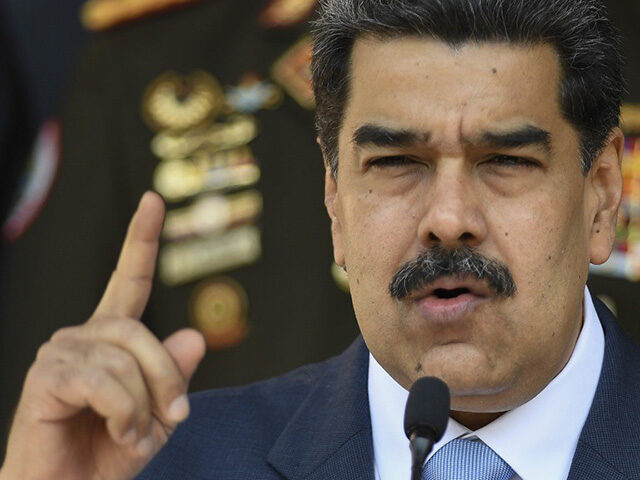CARACAS — Venezuela’s socialist dictator Nicolás Maduro instructed the top members of his authoritarian regime on Monday to open accounts on the Chinese social media platform TikTok to “evade the censorship” that, according to him, the scarcely independent Venezuelan media left is imposing.
Maduro issued his order on Monday evening during the latest broadcast of his weekly television show Con Maduro Más (“With Maduro Plus”). The socialist dictator instructed the president of the National Assembly, Jorge Rodríguez; the vice president of the United Socialist Party of Venezuela (PSUV) and alleged drug lord Diosdado Cabello; and members of his cabinet of ministers to create TikTok accounts to share the “progress” of the regime’s socialist government.
“We have to go to battle in the neighborhood, in the community, even in the corner. A socialist, a chavista, a patriot, a Bolivarian, must have his TikTok account,” Maduro said.
Maduro, an aspiring TikTok influencer, emphasized that all chavistas who join the Chinese platform must share “aesthetic, creative and humorous content.”
The socialist dictator continued by suggesting that the party activities the PSUV carries out nationwide could be broadcast through social media which, in his opinion, will produce a “viralization” of the party’s initiatives and allow the socialist party to “evade censorship.”
“That’s what I say, comrades, imagine that the 6,500 cafecitos [militants] have TikTok accounts,” Maduro continued. “We break the censorship and the veto now, and we win the battle against lies, evil, hatred and fascism.”
The Cafecitos Militantes (“Militant Coffees”) are the PSUV’s latest socialist ideology-laced fad, in which PSUV members are ordered to gather in households, public spaces, or goverment public offices to “share a coffee” and engage in socialist lecturing with the purpose of “strengthening the organization, unity and revolutionary consciousness.” The cafecitos also serve to “reaffirm the commitment” of their participants to the so-called legacy of late socialist dictator Hugo Chávez, who the Maduro regime posthumously refers to as the “Supreme and Eternal Commander of the Revolution.”
Maduro did not provide any evidence of the censorship allegedly committed by local media outlets against his socialist regime. In reality, the Maduro regime has an extensive track record of committing acts of censorship against Venezuelan citizens and forcing private newspapers and television networks to close down, then seizing their assets. The Maduro regime has gone so far as to block access to search engines, news websites, and social media platforms at specific moments to curb the reach of dissenting messages.
The Venezuelan socialist regime has shut down at least 500 media outlets in its 25 years of rule, more than half of them radio stations. The Maduro regime closed down 285 radio stations between 2003 and May 2023.
The Maduro regime not only engages in internet censorship through the state-owned CANTV internet service provider, but also forces private internet providers to block access to news websites, at the risk of losing their operating licenses if they do not. The blocking of local news websites severely cuts down their traffic and causes them heavy losses in ad revenue, further asphyxiating dissenting media.
After Hugo Chávez ordered the forced closure of Radio Caracas Television (RCTV) in 2007, the remaining national channels and radio stations have been forced into self-censorship to survive. Venezuelans do not have access to an independent local news television channel, and even left-wing international networks such as CNN and its Spanish-based subsidiary CNN en Español were banned from the country years ago.
Globovision, the only news-centric channel in the country, took a more pro-Maduro stance after it was sold in 2013 to Raúl Gorrín, a Venezuelan businessman with suspected ties to the Maduro regime currently wanted by the United States on money laundering charges. The administration of former President Donald Trump sanctioned Gorrín in 2019 and accused him of running a graft network that stole $2.4 billion from state coffers through corrupt currency exchange deals.
The Venezuelan socialist regime, after shutting down dissenting media outlets and forcing remaining ones into self-censorship, built its own state-owned media conglomerate to fill the gap: the Bolivarian System of Communication and Information (SIBCI). SIBCI boasts some ten television channels, a vast network of radio stations, and its own array of regional newspapers.
The Maduro regime also enjoys shared ownership of the left-wing propaganda network TeleSUR alongside Cuba’s communist Castro regime and Nicaragua’s Sandinista Ortega regime.
Although Maduro regularly publishes new content on his TikTok account as he sees fit, Venezuelans are heavily punished if found spreading “hateful content” on TikTok that goes against the socialist regime. Olga Mata, an elderly Venezuelan woman, was arrested by the Maduro regime in April 2022 after she published a video on TikTok that satirized Maduro and members of his regime. The Maduro regime, who charged Mata with “incitement to hatred,” released her after she was forced to film a public apology.
Christian K. Caruzo is a Venezuelan writer and documents life under socialism. You can follow him on Twitter here.

COMMENTS
Please let us know if you're having issues with commenting.